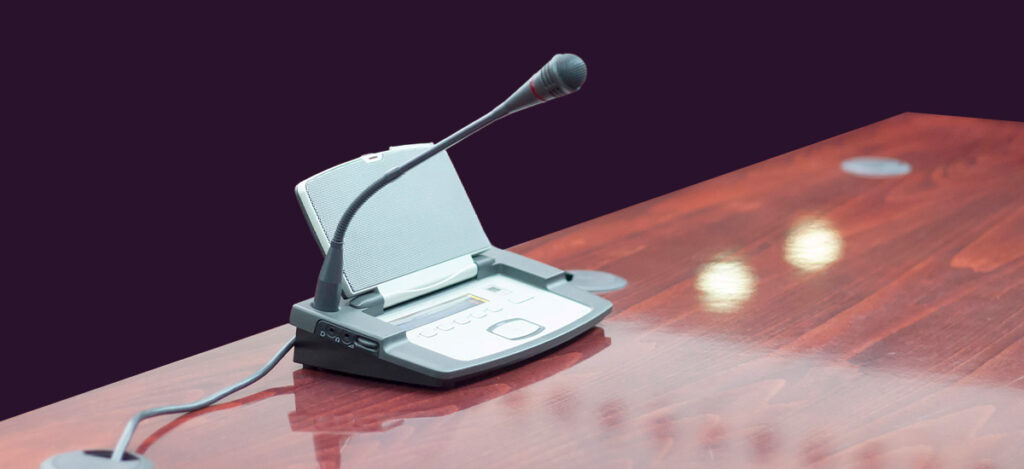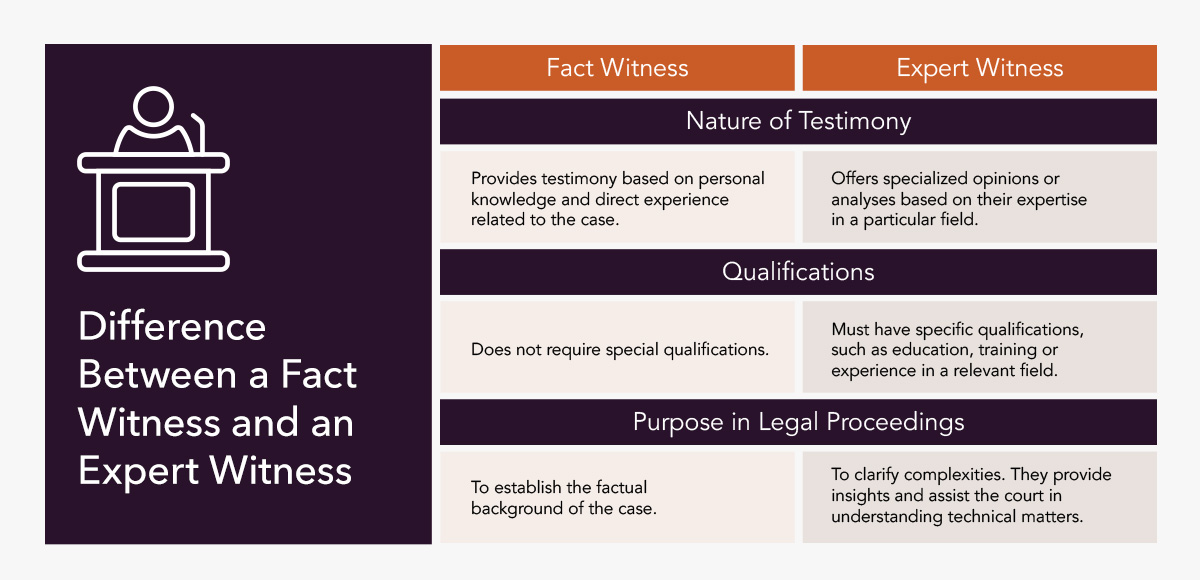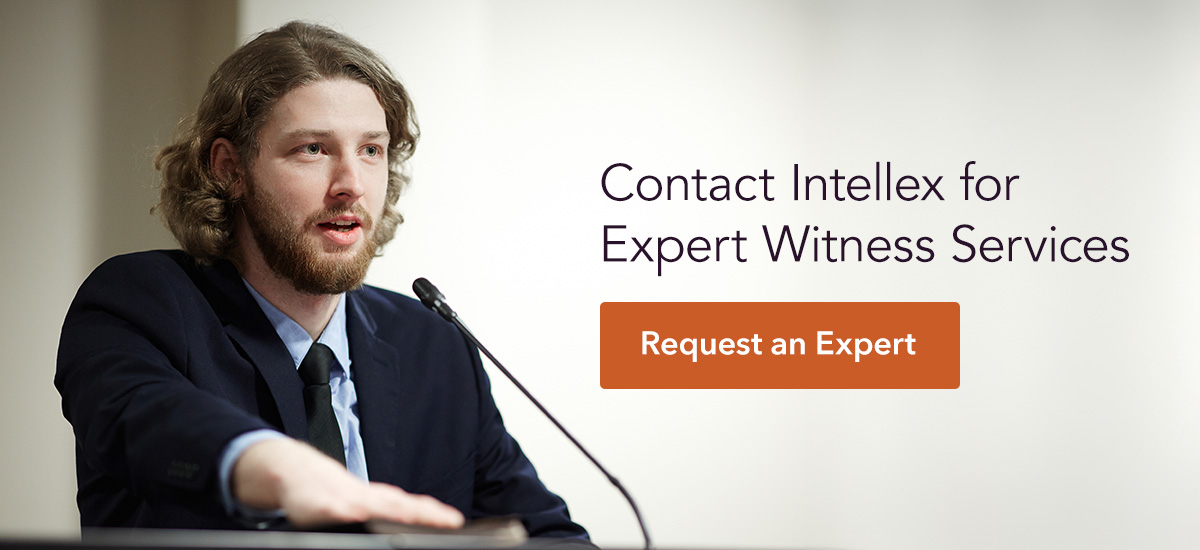
Fact and expert witnesses are two types of witnesses that help resolve legal disputes. Their testimonies help parties prove claims, but they take different approaches. But what do fact and expert witnesses do? Can a fact witness be an expert witness at the same time? If yes, in what instances?
Learning the differences and similarities is essential for attorneys, so we prepared this guide to broaden your understanding. We start by defining factual and expert witnesses and their differences. Then, we dive into their roles, the meaning of dual witnesses and the collaboration between the witness types.
What Is a Fact Witness?
A fact witness, also called a factual witness or a witness of fact, is an individual who testifies in legal proceedings based on their personal knowledge of the events or circumstances at issue. They are called to testify about what they have heard, seen or experienced relevant to the case. They provide factual information to help the trier of fact understand the circumstances surrounding a case. For example, parties in a civil lawsuit are usually fact witnesses as they have firsthand knowledge of the events leading to the dispute.
What Is an Expert Witness?
An expert witness is a person with specialized knowledge, skills, experience, education or training in a particular field or subject matter relevant to a case. Unlike fact witnesses, who testify about their direct observations and experiences, expert witnesses provide analyses, opinions and conclusions based on their expertise.
What Is the Difference Between a Fact Witness and an Expert Witness?
The primary distinctions between fact and expert witnesses lie in their qualifications, roles and the type of testimony they provide. Here is a breakdown:

1. Nature of Testimony
Fact witnesses provide testimony based on personal knowledge and direct experience related to the case. They describe the facts, events or observations they have personally witnessed or experienced. Conversely, expert witnesses offer specialized opinions or analyses based on their expertise in a particular field.
2. Qualifications
Being a fact witness does not require special qualifications. The primary consideration is firsthand knowledge or experience of the facts in the issue. On the contrary, expert witnesses must have specific qualifications, such as education, training or experience in a relevant field. In certain instances, they must demonstrate their expertise through credentials, publications or professional experience.
3. Purpose in Legal Proceedings
Generally, the aim of having fact witnesses is to establish the factual background of the case. They provide context and evidence about what occurred. Expert witnesses aim to clarify complexities. They provide insights and assist the court in understanding technical matters. Expert witnesses may also provide opinions that influence the interpretation of facts or evidence.
The Role of Fact Witnesses
Fact witnesses play crucial roles in legal proceedings, including the following:
- Providing testimony: Fact witnesses share their firsthand accounts of events relevant to the case, helping to resolve legal issues.
- Establishing facts: They help establish the factual background of the case by presenting evidence to support or contradict claims.
- Clarifying evidence: They clarify complex situations by providing context or details not readily available from physical evidence.
- Supporting credibility: Their testimony can lend credibility to a party’s claims or corroborate other evidence before the court.
Overall, fact witnesses can present a clear and accurate picture of the events leading to the dispute.
The Role of Expert Witnesses
Expert witnesses are typically called upon to perform functions like the following:
- Explain complex concepts: Expert witnesses help the court understand technical or specialized information that may be beyond the knowledge of the judge or jury.
- Provide opinions: They can give their professional opinions about the evidence presented. This may include the likely cause of an accident, the validity of a scientific study or the appropriateness of medical treatment.
- Assist in evaluating evidence: Their analysis can help the court assess the credibility of evidence or the validity of methods used in the case.
- Support legal arguments: Expert witnesses may help parties in a civil or criminal matter strengthen their case by providing authoritative insights.
To qualify as an expert witness, a person must demonstrate their qualifications and establish expertise in the subject area.
Can a Witness Be Both a Fact Witness and an Expert Witness?
Yes, a witness can provide both factual and expert testimony. Such a witness is called a dual witness. This situation usually arises when someone has firsthand knowledge of the event and possesses specialized expertise in the field.
Typically, the court must approve such a person to act as a dual witness. An individual called upon to provide factual testimony may not automatically assume the position of an expert to provide technical knowledge or opinions. If they do, the testimony may be thrown out, for example, on the grounds of hearsay.
Since dual witnesses are usually allowed only in exceptional circumstances, specific processes are typically followed. Generally, the individual must first be declared a fact witness and then an expert. The court will consider certain factors, like the relevance of both testimonies to the case, before making a determination.
The court will also consider whether the expert meets the threshold under Rule 702 of the Federal Rules of Evidence. Simply demonstrating some level of experience and knowledge may be insufficient. Remember, fact and evidence witnesses play very different roles.
Collaboration Between Fact and Expert Witnesses
Fact and expert witnesses play complementary roles. They often support each other’s testimonies and strengthen legal cases. Let’s dive deeper:
1. Complementary Roles
While offering different perspectives, the factual and expert testimonies complement each other. Factual evidence provides direct and contextual information, but an expert witness takes a technical approach. Expert evidence can corroborate factual evidence, helping parties meet the required standard of proof.
2. Supporting Testimonies
Related to the complementary nature of factual and expert testimonies, these two types of evidence often support the overall credibility of the case. Expert witnesses can help clarify and expand upon factual testimonies from fact witnesses. This reinforcement can fill the gaps in the factual testimonies.
3. Strengthening Legal Cases
The collaboration of fact and expert witnesses can help create compelling cases for judges and juries. The interplay between them can provide a clearer picture of the situation, making it easier for the court to understand the legal implications of the facts. Attorneys can leverage this strategy to make arguments or settle disputes.
Contact Intellex for Expert Witness Services
Fact and expert witnesses are two sides of a coin. Factual testimonies focus on personal observations, experiences and knowledge of specific events, whereas expert testimonies are based on specialized or technical knowledge. In the end, both achieve the same goal — helping prove the existence or non-existence of a fact.
As a lawyer, you must understand their differences and similarities and how they play out in legal proceedings. Partnering with experts who have the necessary credentials and experience is equally vital to increase your chances of success.
Intellex has a team of expert witnesses with in-depth knowledge of over 30,000 subjects. With years of experience assisting legal professionals, we can give you the best chance of success with your case in court or settlement. We are highly respected in the industry and ready to provide support. Request an expert today!

